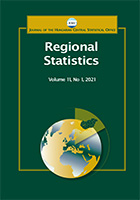Can democratic transition lead to more foreign aid inflow? A synthetic control method analysis of Senegal, 1985–2018
Can democratic transition lead to more foreign aid inflow? A synthetic control method analysis of Senegal, 1985–2018
Author(s): Botond KapásSubject(s): Social Sciences, Economy, Geography, Regional studies
Published by: Központi Statisztikai Hivatal
Keywords: foreign aid; democratic transition; economic growth; Senegal; synthetic control method
Summary/Abstract: This paper is concerned with the question of whether democratic transition causes more foreign aid inflow to recipient countries. By focusing on Sub-Saharan Africa, a novel econometrics method, the synthetic control method (SCM) developed by Abadie et al. (2010), is applied to assess the causal effect of a “treatment”, i.e., democratization. The treatment unit is Senegal, which underwent democratization in 2000 and has since been a stable democracy; the untreated units are five other Sub-Saharan countries. The results indicate that democratization resulted in the “treated” country, that is, Senegal receiving significantly more foreign aid than it would have received if it had remained an autocracy, a finding that is robust to various robustness checks. Converting the detected extra foreign aid into an extra growth rate indicates a substantial (3.217 percentage points) additional growth rate for Senegal, ceteris paribus. However, the results should be interpreted with great caution, as they may not be generalizable and applicable to all cases; that is, general policy implications cannot be drawn based on a single case.
Journal: Regional Statistics
- Issue Year: 13/2023
- Issue No: 05
- Page Range: 951-972
- Page Count: 22
- Language: English

